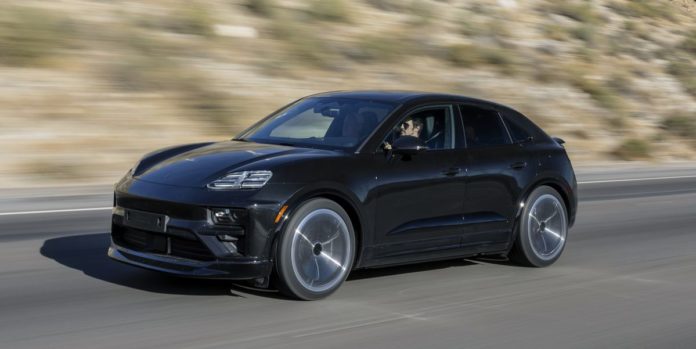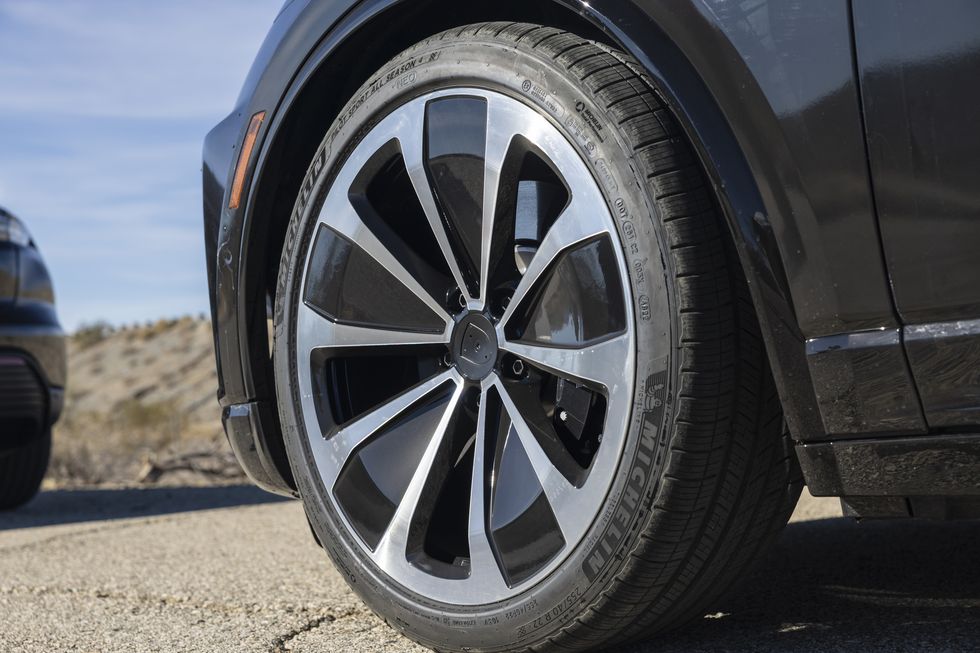Porsche invited us to get behind the wheel of the upcoming Macan EV, the electric SUV that will be the brand’s second modern EV entry. There’s not a lot we can say about how it rides and drives because Porsche stressed that these were prototype vehicles that did not have final suspension, steering, or brake tuning. This early drive was more of a range demonstration, although our calculated result isn’t comparable with our range test of other EVs for reasons we’ll explain.
The preproduction cars we drove were still slathered in a veneer of camouflage. But it was pretty minimalist, without shape-distorting protrusions that would add aerodynamic drag, so we can see what the Macan EV really looks like. The rounded shape, in combination with the dark finish, makes the new Macan EV look smaller than it actually is. In reality, its wheelbase is markedly longer (though no official specs have been released). This is to make room for the approximately 100-kWh underfloor battery that provides around 90 kilowatt-hours of usable energy.
The other thing that jumps out is that what typically counts as headlights on a Porsche are actually the Macan EV’s daytime running lights. The headlights are set vertically, just below in the front fascia. Porsche also can’t hide the tires and wheels, which are Pirelli Scorpion MS Elect all-seasons, sized 235/55R-20 (front) and 285/45R-20 (rear) on the base model. The so-called “top” model (Porsche isn’t sharing trim names yet) wears Michelin Pilot Sport All Season 4 tires consisting of 255/40R-22s up front and 295/35R-22s in back. Both have designs with five small triangular openings, but the base wheels are unashamedly smooth, while the 22s have a slightly more protuberant topography that allows for a machined surface reminiscent of Fuchs-style wheels.
Porsche has been far more forthcoming about mechanical details pertaining to the EV drive system. Two permanent-magnet synchronous AC motors power all-wheel-drive Macan EVs (the announced rear-drive variant is uncertain for the U.S. market), and unlike the Taycan sedan with its rear two-speed transmission, both ends are driven through a single-speed direct-drive gearbox. The base power and torque outputs have not been revealed, but Porsche has confirmed maximum output for the top model at 603 horsepower and 737 pound-feet of torque. Those numbers may change, however, because Porsche is adopting a new United Nations–developed EV-power determination standard.
We also know the Macan EV will have an 800-volt electrical architecture, like the Taycan. It’ll be able to draw electricity at a peak rate of 270 kilowatts and ultimately refill its battery from 10 to 80 percent in just 22 minutes—at a suitably equipped DC fast-charge station, of course. Likewise, the 800-volt architecture gives it significant regenerative-braking capacity that maxes out at 240 kilowatts, which amounts to 0.44 g of deceleration without involving the brake pads and rotors.
But this level of deceleration is never expressed in a one-pedal driving mode, as Porsche’s position has not budged from its Taycan stance: All brake activation will be done via the brake pedal, and the computer will decide whether the driver’s wish is carried out via the regenerative or friction brakes. The driver’s only lift-throttle choice is between a coasting/sailing mode and a light regen setting that merely mimics the familiar feeling of a gas-powered car’s engine braking.
For our range run, Porsche tried to accommodate our needs by cooking up an out-and-back course that started at the eastern edge of the Los Angeles Basin and ran out into the desert. We could run at any speed, so we chose 75 mph, as we always do in our official testing. But our range tests are never as simple as that because we time our runs when traffic is free-flowing. That’s comparatively easy to accomplish near our Ann Arbor, Michigan, headquarters but devilishly difficult in Southern California. There’s also not much in the way of hills in Michigan, but escaping the L.A. Basin always requires climbing some grade or other, no matter which direction you head. At least every uphill would become a downhill in the out-and-back format we ran, but the topography didn’t match our usual process.
In the end, traffic hobbled our average speed, which sagged to 63 mph, though we did run at 75 mph for three-quarters of the drive. After covering 251.6 miles, our base-model Macan had 30 miles and 11 percent battery remaining, which does at least match our usual goal of running down to approximately 10 percent and then doing a regression. When we did that for our driving scenario, the result was 280 miles for a base Macan EV, but there are plenty of asterisks attached to that: prototype vehicle, low average speed due to traffic, and long grades.
It’s hard to say what this means for an eventual EPA-range rating for the Macan EV because the Taycan notoriously outperformed what turned out to be very conservative EPA figures. Porsche seems more willing to tell it like it is this time so that Macan buyers aren’t scared off by low EPA numbers. But it’s still in Porsche’s DNA to err on the side of caution (we tend to beat the company’s quoted 60-mph and quarter-mile times).
In the end, this was a decent showing for the Macan EV, and the traffic we encountered makes it a realistic result for future owners leaving town from a big city such as L.A. We drove more than halfway to San Francisco, Las Vegas, or Phoenix, suggesting those trips would be one-stop affairs, just like they are in gasoline-powered cars.
Dan Edmunds was born into the world of automobiles, but not how you might think. His father was a retired racing driver who opened Autoresearch, a race-car-building shop, where Dan cut his teeth as a metal fabricator. Engineering school followed, then SCCA Showroom Stock racing, and that combination landed him suspension development jobs at two different automakers. His writing career began when he was picked up by Edmunds.com (no relation) to build a testing department.



